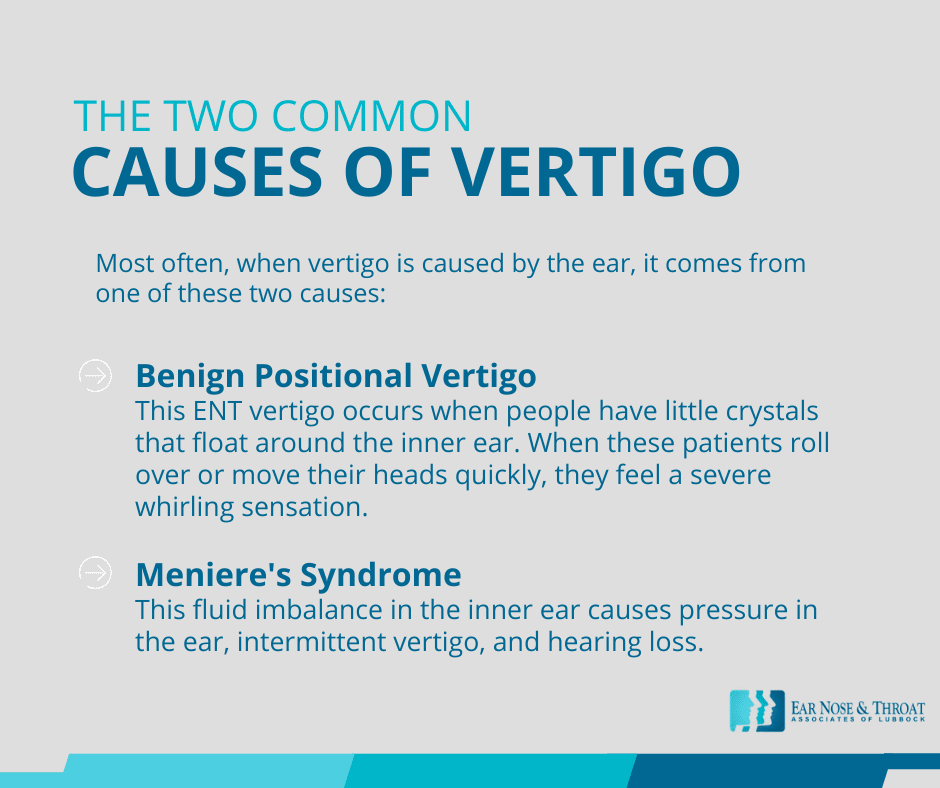Why You Experience Vertigo & How to Know if You Need an ENT

Feeling the dizzy experience of vertigo can quickly have you reaching for the phone to call your doctor, ENT, or anyone who can help you regain your sense of stability again!
But before you call, you may want to consider what’s actually happening so you visit the right specialist who can offer the right treatment for you.
If you’re dizzy and feeling unstable, it’s time to take a look at what the real problem may be. Here’s what you need to know:
What is Vertigo and What Causes It?
Vertigo describes any abnormal sensation of movement. Many people experience whirling vertigo, a spinning sensation that makes them feel like they’re trapped on a merry-go-round. It can also affect balance.
With patients experiencing any abnormal movement sensations, an ENT will look for possible ear causes. We’re trying to determine if something may be happening in the inner ear to cause vertigo. Most often, when vertigo is caused by the ear, it comes from one of these two causes:
1. Benign Positional Vertigo
This vertigo occurs when people have little crystals that float around the inner ear. When these patients roll over or move their heads quickly, they feel a severe whirling sensation.
Benign positional vertigo is fairly common and is resolved with a simple treatment. To alleviate the dizziness, we guide the patient through a series of head positions. These positions move the crystals to a different part of the ear where they aren’t problematic.
2. Meniere’s Syndrome
Meniere’s syndrome can also indicate ENT-related vertigo. This fluid imbalance in the inner ear causes:
- Pressure in the ear
- Intermittent vertigo
- Hearing loss
Other Ear Related Causes of Vertigo
We also consider viral inner ear infections (called Labyrinthitis) and blood flow problems in the ear as potential causes of dizziness and imbalance.
The only way to adequately treat vertigo is to correctly identify what’s causing it. We start by understanding the patient’s history— often the most important part of the process. We also typically perform a hearing test and may recommend an MRI for some patients.

Vertigo, Imbalance, and Dizziness: What’s the Difference?
How do you know when vertigo is an ENT issue, or when something else is causing the problem?
Start by examining your own balance. Many people who come to see us for vertigo are actually dealing with balance problems. We call it a multi-sensory deficit. Balance difficulties increase with age. You lose your core strength as you get older. Plus, if you had a knee replacement or another injury, you likely feel more unsteady.
To determine if you’re dealing with a balance issue, we ask, “How do you manage in the grocery store?” If you do well, you’re likely dealing with a balance problem. When you hold on to a cart, you walk better because it’s like holding on to a walker. If balance is your primary issue, we’ll refer you to physical therapy to work on stability. We can typically recognize imbalance quickly and connect patients with the right treatment to resolve the issue.
While imbalance most often occurs from a lack of muscular stability, dizziness and vertigo have a wide range of causes.
Dizziness, an abnormal sensation of movement, can be an attribute of vertigo but can also stem from anything from medication side effects, dehydration, low blood pressure and even anxiety.
Vertigo, a whirling, spinning sensation, is abrupt and intermittent. It has a wide range of causes and can last anywhere from a few minutes to a few hours. Typically, vertigo is triggered by a change in head position.
The hallmark of inner ear or ENT vertigo is how symptoms fluctuate. Symptoms worsen, improve, then flare up again. Balance, however, tends to remain consistently difficult until therapy. If you’re dealing with vertigo, the whirling, spinning sensation is abrupt and intermittent.
In some cases, vertigo is related to neurological issues. For these patients, we eliminate other causes and provide a reference to a neurologist.
ENTs are great at finding the differences between these various problems. On the surface, it can be difficult to tell what’s going on. We work to distinguish between inner ear, balance, and neurological issues. Then, we can either begin treatment or make the referral to the right specialist.
When to Seek Help for Vertigo
If your dizziness is mild and resolves on its own, there’s not necessarily a need to seek medical help.
However, if it continues to occur or you notice other symptoms, talk to your doctor. Symptoms such as hearing loss, facial numbness, difficulty walking, or anything besides just dizziness needs to be checked out by a professional.
Not sure who to see? Visiting an ENT doctor is a good place to start, but it is often helpful to check with your primary care physician to rule out other factors of dizziness (i.e. medication issues, poor circulation, stress or anxiety). ENTs see many patients with these issues — and most of us can figure out the true source of the problem relatively fast.
ENT Vertigo Treatments
For patients dealing with ENT-related vertigo, we offer a wide variety of treatments from steroid injections to various minor and major surgeries depending on the exact needs of the patient. For patients with Meniere’s syndrome, we might recommend surgical treatments to address the fluid imbalance. For other patients, an inner ear steroid injection resolves their issue. Some patients also benefit from medications that ease the symptoms.
If your vertigo isn’t improving on its own, come see an ENT. We’ll figure out what’s going on and find the treatment that’s best for you.
Dr. Scolaro is a board-certified Otolaryngologist servicing the South Plains area. He has been practicing in Lubbock since 1990 and has earned a reputation as a skilled and experienced surgeon. He currently serves as the Medical Director for Covenant High Plains Surgery Center campuses, is a member of Covenant Health Partners and is an adjunct faculty professor for Texas Tech University Health Sciences Center School of Medicine. Learn more about Dr. Scolaro.
Categories:








